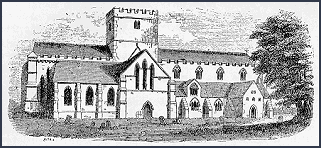
The medieval church 2
The Norman overlords
The drive for reform
Although some of these newly created priories - like the Priory of St Johns in Brecon (below)
eventually broke away from control of an English or French
mother house, they heavily depended on the protection of the
local Norman lordship and recruitment from foreign houses and
from Anglo-Norman settlers in Wales.
The Norman overlords w ere
determined to extend recent reforms in northern Europe to their
new dominions in Wales, and they set about this task with some
zeal. The clas at Llandudoch on the Teifi estuary, for
example, was swept away by the Norman lord of Cemais and a new
Benedictine house was founded on the site with a complement of
thirteen monks from Tiron.
ere
determined to extend recent reforms in northern Europe to their
new dominions in Wales, and they set about this task with some
zeal. The clas at Llandudoch on the Teifi estuary, for
example, was swept away by the Norman lord of Cemais and a new
Benedictine house was founded on the site with a complement of
thirteen monks from Tiron.
The Welsh saints to whom monasteries were dedicated were often
replaced with more widely accepted saints, as at Glasbury where
St Peter replaced St Cynidr, or supplemented as at Llandrinio
or St Davids itself.
Imposing new standards
Outside the Norman lordships Welsh ecclesiastical traditions
survived as at the clas at Llandinam and in the many references
to Welsh hermits like Wechelen the hermit of Llowes in Radnorshire.
The growing presence of new ‘foreign’ houses in Wales
and the Norman control of the dioceses, however, brought the
native ecclesiastical organisations under pressure to reform.
By 1150 Wales had been divided into four clearly defined dioceses,
and the bishops were quick to harness older Welsh traditions
to their newly acquired authority. More importantly for Wales
this new authority allowed the bishops to accelerate the development
of an ecclesiastical hierarchy and parish structure across Wales.
Synods and provincial councils, supported by visitations like
those of Gerald of Wales, began to impose standards of clerical
behaviour, and the consistory courts imposed the church’s
expectations regarding morality onto the local population.
There are 5 main pages on the medieval church in Wales. Use the box links below to view the other pages.